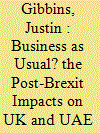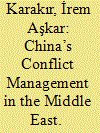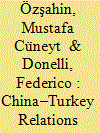|
|
|
Sort Order |
|
|
|
Items / Page
|
|
|
|
|
|
|
| Srl | Item |
| 1 |
ID:
184348


|
|
|
|
|
| Summary/Abstract |
Since the formal leaving of the United Kingdom from the European Union on January 31, 2020, much discussion has focused on the consequences for British foreign policy. Predictions broadly fit into two outcomes: internationalism, echoed in the “global Britain” mantra, and isolationism, with a Britain struggling to be heard on the world stage. As British foreign and trade policies are being shaped by a desire to seek out new friends, and reaffirm contacts with old ones, the United Arab Emirates, a Gulf Cooperation Council country with a palpable set of linkages to the UK, will be impacted. Military, diplomatic and economic ties are robust, but the UAE’s position, particularly in light of its rising-power regional status, requires investigation. With some believing British influence will be stymied by its non-EU status, and with a UAE that has reversed its traditional nonintervention status to become more regionally resurgent, what would this mean for future UK–UAE relations? This article seeks to provide an early snapshot of the post-Brexit relationship between the two.
|
|
|
|
|
|
|
|
|
|
|
|
|
|
|
|
| 2 |
ID:
184350


|
|
|
|
|
| Summary/Abstract |
China’s foreign policy toward the Middle East has traditionally been shaped by its national interests based on energy security, arms exports, and technology transfers. To complement its interest-driven regional policies, China has expanded its diplomatic contacts and promoted cultural ties. Over the last two decades, China has also engaged in conflict management in several regional issues, despite its declared commitment to nonintervention in other countries’ domestic affairs. This article aims to analyze China’s conflict management policies in the region, focusing on the Israeli–Palestinian conflict, Iran’s nuclear program and the Syrian conflict. Compared with other major external powers, prospects for China’s conflict management seem high given two significant advantages. First, unlike Western powers or Russia, China has not left any bitter taste in the region associated with colonialism, religious or historical engagement. Secondly, China has been careful not to take clear-cut sides in regional conflicts, making itself an ideal candidate to act as an honest broker. It is argued that despite these advantages, Chinese conflict management in the region has remained considerably modest and lacked any practical solutions to the critical problems.
|
|
|
|
|
|
|
|
|
|
|
|
|
|
|
|
| 3 |
ID:
184349


|
|
|
|
|
| Summary/Abstract |
There is plenty of studies focusing on China’s global outreach through its Belt and Road Initiative (BRI). In tandem with this, the extensive literature on China depicts it as the next hegemon to succeed in the USA. Along this line, flourishing ties with various Asian nations, including the Middle Eastern countries, as a result of China’s recent foreign policy activism has been addressed extensively. While most research has been stressing the rising assertiveness of China in world politics, only a limited number of studies have touched upon the responses from middle or small powers against China’s ascent. Drawing from neoclassical realism, this article contends two levels of analysis for delineating the interaction between Turkey, a middle power, and China, a rising great power. First, the exchange between Turkey and the USA is vital in determining the cordial relations between Turkey and China. Alteration in the American policy vis-à-vis Turkey in the wake of the Arab Spring is relevant to Turkey’s growing relations with China. Second, is the rising anti-Westernism of foreign policy elites as part of the alteration in the strategic culture of Turkish politics, which makes Turkey’s rapprochement with China possible. Nevertheless, it should be noted that these two levels are intertwined and feed each other. Consequently, employing a neoclassical realist approach, the article argues that the middle powers’ stance against a rising hegemon is conditional upon the bilateral relations with the current hegemon and peculiarities of domestic politics.
|
|
|
|
|
|
|
|
|
|
|
|
|
|
|
|
| 4 |
ID:
184344


|
|
|
|
|
| Summary/Abstract |
I was flying to Jerusalem. It was my maiden flight. I was going to Israel for a 3-month field trip; what a luxury! These days, financial constraints considerably reduce the Jawaharlal Nehru University (JNU)-sponsored field visits to a week or 10 days. The support in those pre-economic reform eras came with US$25 per diem, along with international tickets. While the university committee approved my field trip in May 1987, procedural issues, RBI clearance, and budgetary process delayed it by a year. Finally, the trip was set for the mid-1988, a few months after the outbreak of the first Palestinian intifada.
|
|
|
|
|
|
|
|
|
|
|
|
|
|
|
|
| 5 |
ID:
184345


|
|
|
|
|
| Summary/Abstract |
This article offers a new perspective on the extensive discussion of the role of new media in facilitating the 2011 Egyptian uprising by placing it within the historical context of how the state responded to new media in the previous decades. This article uses an archaeological analysis of state media to reveal how the state coped with the news media (newspapers, radio, television, satellite television) in the past to infer the present relationship between the state and the new media (the internet and social media). We discerned a recurring cyclical pattern characterized by a dynamic of openness–adaptation–narrowing, which sheds light on the media’s ability to challenge state authority and on the state’s ability to contain and limit new media. We suggest that the role of the internet and social media in the Egyptian “Arab Spring” should be viewed as being on this continuum, as an extension of processes of state–media relations that had developed in the preceding decades.
|
|
|
|
|
|
|
|
|
|
|
|
|
|
|
|
| 6 |
ID:
184347


|
|
|
|
|
| Summary/Abstract |
This article will review Turkey’s political and economic relations with the United Arab Emirates from the establishment of ties upon the latter achieving independence from Britain to the present through the changing regional and international scene of the Cold War and post-Cold War periods. While Turkey did not pay much attention to the Gulf region initially, the situation changed following the establishment of the Gulf Cooperation Council in 1981 and Turgut Özal becoming prime minister two years later. Özal was a devout Muslim and sought to boost ties with Middle Eastern countries while reaping economic benefits, but his efforts were not as extensive as they have become under the Justice and Development Party (AKP), which came to power in 2002. The AKP regards Turkey as a leading force in promoting the interests especially of Sunni Muslims in the Middle East and the rest of the Islamic world. Despite constructive bilateral efforts at political and economic cooperation, the AKP’s connections with the Muslim Brotherhood have complicated Turkey’s relations with the UAE, as the latter has been concerned with its indigenous Islamist group al-Islah. Since the overthrow of Egyptian President Muhammad Morsi, a political rivalry has developed between the two over differing regional perspectives.
|
|
|
|
|
|
|
|
|
|
|
|
|
|
|
|
| 7 |
ID:
184346


|
|
|
|
|
| Summary/Abstract |
The use of social media platforms by the education sector has grown significantly in the past decade. The advancement in information and technology has prompted the integration of social media use in education. Social media use has revolutionized the learning processes from what was traditionally teacher-centered to the current student-centered approach. People between 16 and 24 years of age are considered among the active users of social media; hence, by incorporating an important part of their lives in school activities, learning may become more amusing and improve performance. Despite the United Arab Emirates being considered the technological hub of the Middle East, it has made minimal steps toward integrating social media in the learning system for high school students. This article explores the type of social media used by students and teachers in the Emirati high school system and examines the favorable social media tools used in learning in high schools by teachers and students and responds to questions like the purposes of using social media in learning and does social media use in learning affect student and teacher satisfaction and attitude? Further, it asks what the impacts of using social media on learning are. Finally, it discusses the challenges students and teachers come across when using social media for learning.
|
|
|
|
|
|
|
|
|
|
|
|
|
|
|
|
|
|
|
|
|